- Walk this way: the United Way March of 1,000 Umbrellas is back
- President Goel meets with new Black faculty and staff
- Study permit delay affects many international students - here's how Waterloo's responding
- What deep learning algorithms can teach us about snow
- Pop-up booster clinic on campus next week
Editor:
Brandon Sweet
University Communications
bulletin@uwaterloo.ca
Walk this way: the United Way March of 1,000 Umbrellas is back
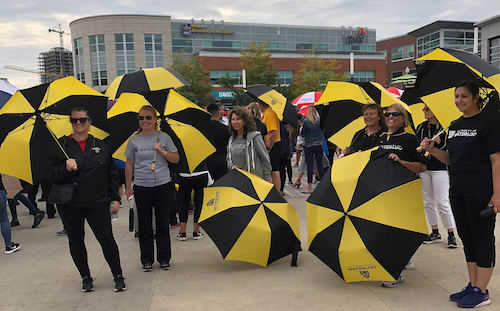
A message from the University of Waterloo United Way Campaign committee.
United Way Waterloo Region Communities is excited for the return of its annual March of 1,000 Umbrellas – a 3 km walk from Waterloo City Hall in Waterloo to Carl Zehr Square in Kitchener. This march kicks off their fundraising campaign and is an incredible display of community, support, and awareness of the positive impact the United Way has on Waterloo Region.
Join the Waterloo Crew
This year’s march will take place on Thursday, September 15, - and you’re invited We’ll depart campus at 10:45 a.m. to join all participants at Waterloo City Hall. When we arrive at Carl Zehr Square, we’ll enjoy a complimentary lunch from Borealis Grille and Bar and entertainment by Canada’s Got Talent finalist, Stacey Kay. Register to join our Waterloo group and help us fill the route with black and gold! Questions? Email united.way@uwaterloo.ca.
Why the United Way matters
“The United Way plays a vital role in the support of social services here in Waterloo Region,” says CEO Joan Fisk. “We are second only to government when it comes to funding community programs like family counselling services, after-school programs, and emergency food hampers.”
There is a great need in the community for the variety of organizations the United Way funds, with many people depending upon their programs for support with mental health issues, disabilities, poverty, and unemployment. The march demonstrates that there are people in this community who care deeply about all members of society and want to see the continuation of the good work the United Way does.
Fisk continues, “our community agencies have had to do more with less throughout the pandemic and the need is continuing to grow. We work with nearly 130 agencies, who combined, support almost 60,000 people across Waterloo Region every six months. Sadly, we are only able to address about 40 per cent of the funding requests we receive.
This is why the University of Waterloo United Way Campaign is so important. Fundraising efforts from staff and retirees allow us to help address the issues that our most vulnerable community members are facing; housing and homelessness, increasing food security, and advocating for mental health. This march is a fantastic way for the campus community to show its support.”
Promoting solidarity with the United Way is just one way you can become part of a community-wide movement to improve the lives of those who matter. Join the University of Waterloo’s team by registering for the March of 1,000 Umbrellas on September 15. We hope to see you there.
President Goel meets with new Black faculty and staff
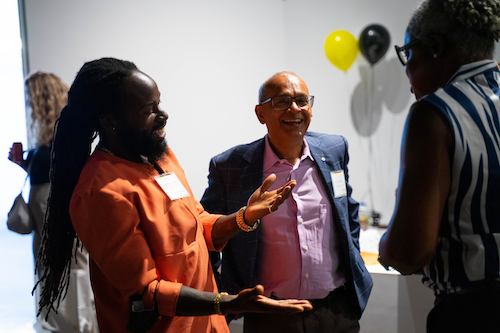
This article originally appeared in The Catalyst e-newsletter.
Newly hired Black faculty and staff recently received an official welcome to the University of Waterloo, during a meet and greet with President Vivek Goel and other senior leaders. The event, organized through a collaboration with the Black Faculty and Staff Collective (BFSC) and the Equity, Diversity, Inclusion and Anti-racism office (EDI-RO), is one of several orientation activities to welcome recently hired faculty and staff.
Increasing representation among Black and Indigenous faculty and staff to be more reflective of the community it serves and creating welcoming and supporting environments for new racialized hires to thrive are among the recommendations coming from the President’s Anti-racism Taskforce. UWaterloo’s strategic plan also acknowledges that having a diversity of voices and perspectives enriches teaching and research.
“Those here today represent another step towards our goal of identifying and addressing institutional barriers for Black students, staff and faculty,” said Vivek Goel, President and Vice-Chancellor of the University of Waterloo. “Attracting bright, talented, and committed professionals like yourself is evidence that our work towards embedding equity within our policies, processes, environments and experiences is bearing fruit,” he said.
A founding member of the BFSC, Dr. Kathy Hogarth, now Dean of Social Work at Wilfrid Laurier University, said that while it is inspiring to see some progress in increasing representation, it must also be acknowledged that this progress did not occur by accident.
“Your presence today represents the realization of the efforts of many, including our Black students groups such as Racial Advocacy for Inclusion, Solidarity, and Equity (RAISE), who along with Black faculty members, spoke out against racism, oppression, and a culture rooted in colonial norms, and who advocated at the highest levels of the institution for action in identifying and addressing systemic barriers that affect Blacks at the University,” she said, while addressing the gathering.
“Universities play an important role in educating students and the public about the inequities and injustices that continue to pervade society,” said Dr. Christopher Taylor, Associate Vice-President, Equity, Diversity, Inclusion and Anti-racism. “We all have a role to play in confronting and dismantling any system that upholds an ideology that either directly or indirectly asserts that one group is inherently superior to another,” he said.
The University of Waterloo’s Black Excellence initiative seeks to attract ten tenure-track/tenured academic appointments, representing emerging and established career stages, who will contribute to Black excellence across all six Waterloo Faculties, and to Waterloo’s goal of building and sustaining a culture of equity, diversity, and inclusivity. The initiative is ongoing and to date six Black faculty members have been hired.
The Catalyst Anti-racism newsletter will be producing features on these new Black faculty members and their research in upcoming months.
If you or anyone you know has experienced harm from racism or discrimination, please find help here.
Study permit delay affects many international students - here's how Waterloo's responding
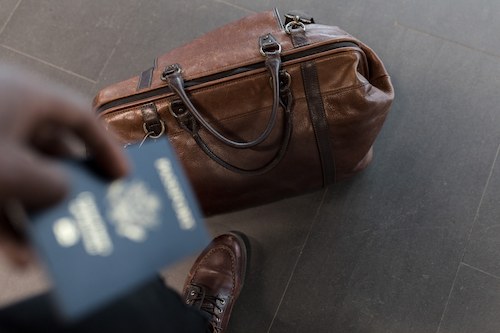
By Megan McGarry.
Due to immigration backlogs, many international students are experiencing delays in receiving their study permits.
While it is not uncommon for students in certain countries to receive their permits only immediately prior to beginning their studies, we are hearing that the issue is affecting many incoming international students in some high-volume countries, such as India. Gautham Kolluri, an immigration consultant in Waterloo, recently told CTV News that the process, typically takes 60 – 90 days; right now, the process is an average of four to five months.
Waterloo is responding with advocacy initiatives and contingency plans for affected students.
The University has written to Canada’s Minister of Immigration, Refugees and Citizenship Canada to express our desire to work with government and other institutions on collaborative solutions. We are also working with colleagues at universities across the country along with the federal government to ensure that Canada’s universities are able to welcome the world’s best students to campus this fall.
We are in regular communication with all our incoming international students, providing them with timely, actionable information about all issues surrounding the study permit application process. Additionally, we have teams of administrative experts who are active in responding to incoming queries, ensuring that all of our incoming students have the information they need.
Some instructors may have made a short-term remote option available in the first week or two of the term at their discretion for students unable to be in Canada at the start of the term because they have not yet received the relevant visa, through no fault of their own. Unfortunately, it is far too complex to offer both in-person and remote options for all courses. To help international students who cannot get to Waterloo in time to start their courses this term, or for whom a short-term online option is not possible we have extended the international student deferral deadline from August 31, 2022 to September 27 for those who wish to defer their admission. Extending this deadline allows more flexibility for students, but we are also expressing caution to these students planning to arrive after September 12 and trying to set realistic expectations. Graduate students can discuss deferral options with the team in GSPA.
Students with a residence contract will now be permitted to arrive up to and including September 20, 2022. If they have not arrived by this date their residence contract will be cancelled with no financial impact. In addition, if a student decides to defer and cancel their residence contract for fall 2022 because they cannot enter Canada, they will not be held financially responsible for their residence contract.
For students who received a President’s Scholarship, the scholarship will be held and will be applied to the term they begin their first-year studies. Consideration for other entrance scholarships will be on a case-by-case basis.
If you have any questions regarding the issue, please contact Kari Pasick-Stewart.
(Please note: an earlier version of this article misstated the University's position on online offerings. The Daily Bulletin regrets the error.)
What deep learning algorithms can teach us about snow

By Jon Parsons. This article was originally published on Waterloo News.
Canadians think they know a lot about snow. It is practically a national pastime to discuss winter weather.
But a PhD student in the Department of Geography and Environmental Management at the University of Waterloo is taking the Canadian obsession with weather to a whole new level.
Fraser King is studying the ways machine learning can be applied to predicting patterns of precipitation, and especially annual snowfall and snowmelt in the context of climate change.
In his latest study, which he undertook with a team of researchers including his PhD supervisor Professor Christopher Fletcher, he puts forward his new weather modelling program under the name DeepPrecip.
“In this new research we’ve been working to develop a model, which is a deep learning computational network,” King says. “It’s difficult to accurately measure snow. There have been other models but they have some limitations. Our new model is helping to move things forward.”
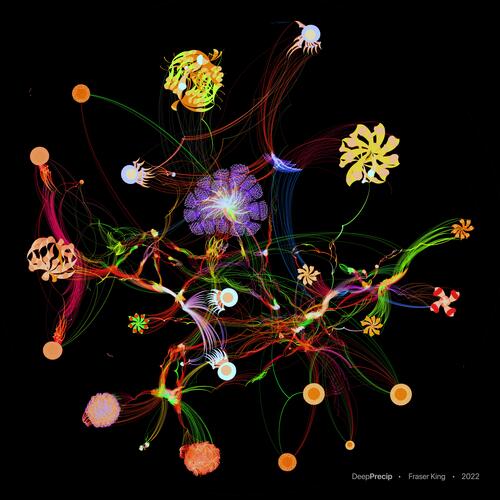
A visual representation of the DeepPrecip deep neural network, including a compute graph render with 1.7 million nodes and 2.8 million edges. The image is a snapshot in time of the deep learning neural network’s complex brain for calculating precipitation.
DeepPrecip takes the mountains of data that exist from radar readings of snowfall and then builds predictive models. Such research is extremely valuable in an era of climate change.
“I feel like we have a responsibility as Canadians to make sure we’re taking care of the land and monitoring it, because it’s going to have global impacts as the climate continues to warm,” King says.
“One of the big questions in atmospheric sciences is understanding changes in snowfall. It’s quite a dynamic process and it’s not one that’s well understood. Any progress we can make in this area is beneficial.”
Mobilizing knowledge
Alongside publishing academic articles to disseminate his research, King has made it a priority to communicate his work to a broader audience, including other researchers outside his discipline and the public at large.
For this current project on DeepPrecip, he published a blog post with the AI company Graphcore and an article on the popular Toward Data Science blog on Medium. The public-facing article is cleverly titled “Do neural networks dream of falling snow?” and alludes to the famous novel by Philip K. Dick.
In a further effort at accessibility, King has made the program itself available and open source on GitHub.
He and his supervisor are also among the finalists in the Natural Sciences and Engineering Research Council of Canada (NSERC) Science Exposed contest for their rendering of the DeepPrecip model (see above image).
King has made a point of translating scientific knowledge into accessible formats for public audiences throughout his academic career.
“I think it’s really important not only to do good research but to take the time to communicate that research to a wider audience,” King says. “Being able to describe the research to stakeholders and funders and being able to describe it to the public at large, is a focus for me and I hope it might excite others to take up the research as well.”
He won the 2019 University of Waterloo GRADflix contest, which challenged researchers to produce one-minute videos that conveyed their work to public audiences (see the video embedded below).
Pop-up booster clinic on campus next week
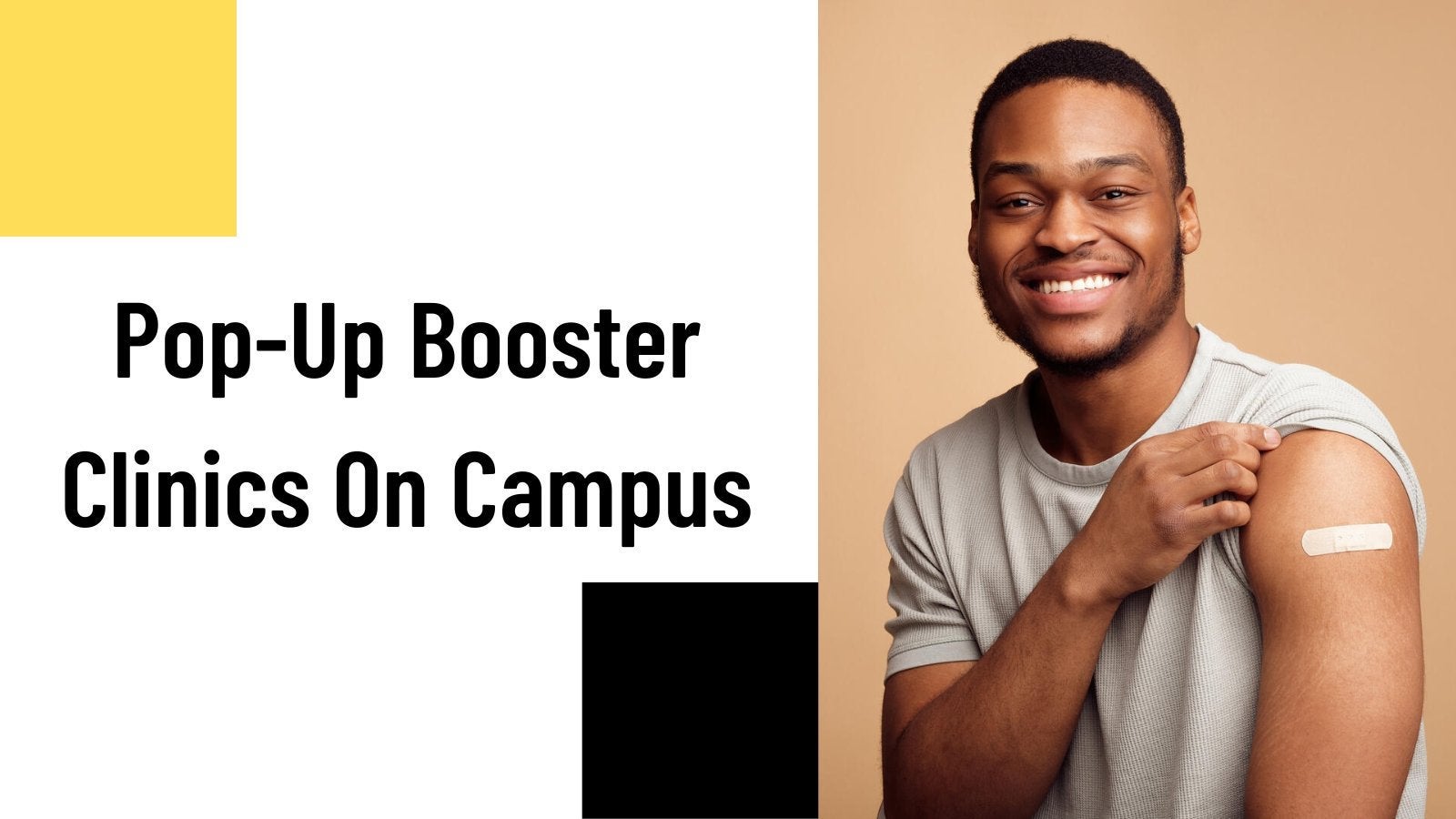
After the great success of yesterday’s pop up COVID-19 vaccine clinic, Region of Waterloo Public Health will return for a second vaccine clinic next week.
The booster clinic will run on Tuesday, September 6 from 12:45 p.m. to 2:45 p.m. in the Student Life Centre basement area (the old W Store Location).
Operated by the Region and supported by Health Services, doses are available to anyone in the Waterloo community (employees and students) who meet the provincial eligibility requirements. Doses are available for those seeking their first, second or booster dose. No appointment is required. The team will have both Moderna and Pfizer doses on site.
Please bring your enhanced vaccine certificate with you if you have one, or any alternate documentation of previous COVID-19 vaccines from within Ontario, out of Province, or out of country.
Anyone with questions can contact coronavirus@uwaterloo.ca.
Link of the day
When and Where to get support
Students can visit the Student Success Office online for supports including academic development, international student resources, immigration consulting, leadership development, exchange and study abroad, and opportunities to get involved.
Instructors looking for targeted support for developing online components for blended learning courses, transitioning remote to fully online courses, revising current online courses, and more please visit Agile Development | Centre for Extended Learning | University of Waterloo (uwaterloo.ca).
Instructors can visit the Keep Learning website to get support on adapting their teaching and learning plans for an online environment.
Course templates are available within your course in LEARN to help you build and edit your content and assignment pages quickly.
The following workshops, webinars, and events are offered by the KL team (CTE, CEL, ITMS, LIB):
-
Scholarship of Teaching and Learning (SoTL) Methods – self-directed, continuous self-enrollment course in LEARN.
-
Independent Blended Course Design (iBlend) - self-directed, continuous self-enrollment course in LEARN.
-
Copyright Overview for Waterloo Instructors and Staff - self-directed, continuous self-enrollment course in LEARN.
-
Independent Remote Course Design Essentials (iReCoDE) - self-directed, continuous self-enrollment course in LEARN.
-
Supporting Student Mental Health (for Instructors) – self-directed, continuous self-enrollment course in LEARN.
Supports are available for employees returning to campus. Visit IST’s Hybrid Work and Technology guidelines and workplace protocols to assist with the transition.
Students with permanent, temporary and suspected disabilities and disabling conditions (medical conditions, injuries, or trauma from discrimination, violence, or oppression) can register with AccessAbility Services for academic accommodations (classroom accommodations, testing accommodations, milestone accommodations).
Instructors can visit AccessAbility Services' Faculty and Staff web page for information about the Instructor/Faculty role in the accommodation process. Instructors/ Faculty members are legally required to accommodate students with disabilities. AccessAbility Services (AAS) is here to help you understand your obligations, and to offer services and resources to help you facilitate accommodations.
The Writing and Communication Centre has in-person and virtual services to support grad and undergrad students, postdocs and faculty with any writing or communication project. Services include one-to-one appointments, drop-ins at Dana Porter Library, online workshops, writing groups, English conversation practice, and custom in-class workshops.
Co-op students can get help finding a job and find supports to successfully work remotely, develop new skills, access wellness and career information, and contact a co-op or career advisor.
The Centre for Career Action (CCA) has services and programs to support undergrads, grad students, postdocs, alumni, and employees in figuring out what they value, what they’re good at, and how to access meaningful work, co-op, volunteer, or graduate/professional school opportunities. Questions about CCA's services? Live chat, call 519-888-4047, or stop by our front desk in the Tatham Centre 8:30 a.m. to 4:30 p.m., Monday to Friday.
Drop-in to Warrior Virtual Study Halls on Wednesdays from 5:30 p.m. to 7:00 p.m. Come together in this virtual space to set goals and work independently or in groups each week.
Renison's English Language Institute continues to offer virtual events and workshops to help students practice their English language skills.
If you feel overwhelmed or anxious and need to talk to somebody, please contact the University’s Campus Wellness services, either Health Services or Counselling Services. You can also contact the University's Centre for Mental Health Research and Treatment. Good2Talk is a post-secondary student helpline available to all students.
The Library is open with expanded hours for access to book stacks, drop-in individual study space, bookable group study rooms, drop-in access to computers and printers, book pick-up services and IST Help Desk support. Librarian consultations, Special Collections & Archives and the Geospatial Centre are available by appointment. Full details on current services and hours are available on the Library’s COVID-19 Update webpage.
The Faculty Association of the University of Waterloo (FAUW) continues to advocate for its members. Check out the FAUW blog for more information.
The University of Waterloo Staff Association (UWSA) continues to advocate for its members. Check out the UWSA blog for more information.
The Sexual Violence Prevention and Response Office (SVPRO) supports all members of the University of Waterloo campus community who have experienced, or been impacted, by sexual violence. This includes all students, staff, faculty and visitors on the main campus, the satellite campuses, and at the affiliated and federated Waterloo Institutes and Colleges. For support, email: svpro@uwaterloo.ca or visit the SVPRO website.
The Office of Indigenous Relations is a central hub that provides guidance, support, and resources to all Indigenous and non-Indigenous campus community members and oversees the University's Indigenization strategy.
The Waterloo Indigenous Student Centre, based at St. Paul’s University College, provides support and resources for Indigenous students, and educational outreach programs for the broader community, including lectures, and events.
WUSA supports for students:
Peer support - MATES, Glow Centre, RAISE, Women’s Centre - Click on one of the links to book an appointment either in person or online for the term.
Food Support Service food hampers are currently available from the Turnkey Desk 24/7 in the Student Life Centre. Drop-off locations are also open again in SLC, DC, DP, SCH, and all residences.
Co-op Connection all available online.
Centre for Academic Policy Support - CAPS is here to assist Waterloo undergraduates throughout their experience in navigating academic policy in the instances of filing petitions, grievances and appeals. Please contact them at caps@wusa.ca.
WUSA Student Legal Protection Program - Seeking legal counsel can be intimidating, especially if it’s your first time facing a legal issue. The legal assistance helpline provides quick access to legal advice in any area of law, including criminal. Just call 1-833-202-4571.
Empower Me is a confidential mental health and wellness service that connects students with qualified counsellors 24/7. They can be reached at 1-833-628-5589.
GSA-UW supports for graduate students:
The Graduate Student Association (GSA-UW) supports students’ academic and social experience and promotes their well-being.
Advising and Support - The GSA advises graduate students experiencing challenges and can help with navigating university policies & filing a grievance, appeal, or petition.
Mental Health covered by the Health Plan - The GSA Health Plan now has an 80 per cent coverage rate (up to $800/year) for Mental Health Practitioners. Your plan includes coverage for psychologists, registered social workers, psychotherapists, and clinical counselors.
Dental Care - The GSA Dental Plan covers 60 to 70 per cent of your dental costs and by visiting dental professionals who are members of the Studentcare Networks, you can receive an additional 20 to 30 per cent coverage.
Student Legal Protection Program - Your GSA fees give you access to unlimited legal advice, accessible via a toll-free helpline: +1-833-202-4571. This advice covers topics including housing disputes, employment disputes, and disputes with an academic institution.
The Graduate House: Open Monday to Tuesday 11:30 a.m. to 7:00 p.m. and Wednesday to Friday 11:30 a.m. to 9:00 p.m. We’re open to all students, faculty, staff, and community members. The Graduate House is a community space run by the GSA-UW. We’re adding new items to the menu. Graduate students who paid their fees can get discounts and free coffee. Note: The Graduate House is closed from August 20 to September 5, 2022.
When and Where (but mostly when)
Warriors vs. Laurier Blood Donation Battle. Join our “Waterloo Warriors” team on the Blood.ca website or app. #ItsInYouToGive
Warriors Youth Summer Day Camps, July 4 to September 2. Open to boys and girls age 5-18. Baseball, Basketball, Football, Hockey, Multi-Sport and Games & Volleyball. Register today.
Warriors Game Day Tickets and Season Passes, on sale now. Cheer on your Warriors W/M Basketball, Football W/M Hockey and W/M Volleyball teams at home during the 2022-23 season. Purchase today.
Visitors Centre in SCH closed, Monday, August 22 to Friday, September 2. Phone and email inquiries will be monitored during weekday business hours.
NEW - Residence move-in, Thursday, September 1 to Sunday, September 4.
NEW - Fall 2022 Orientation, Thursday, September 1 to Saturday, September 10
NEW - Fall 2022 International Orientation, Thursday September 1 to Saturday, September 3.
TBH: To Be Honest premiere performance, Thursday, September 1, 3:00 p.m. to 4:00 p.m., PAC gym.
Labour Day holiday, Monday, September 5, most University operations closed.
NEW - Co-operative work term begins, Tuesday, September 6.
NEW - Graduate student orientation, Tuesday, September 6.
NEW - Fall 2022 lectures and classes begin, Wednesday, September 7.
Deadline to register for Centre for Extended Learning (CEL) "Getting Ready to Facilitate Online Courses: TA Training – Fall 2022" course, Sunday, September 11.
NEW - University of Graz x University of Waterloo Erasmus+ Staff Mobilities 2022 application deadline, September 30, 2022.
PhD oral defences
Combinatorics and Optimization. Lukas Nabergall, "Enumerative perspectives on chord diagrams." Supervisor, Karen Yeats. Thesis available from MGO - mgo@uwaterloo.ca. Oral defence Tuesday, September 6, 1:00 p.m., MC 5479 and online.
Applied Mathematics. Mana Donganont, "Consensus Problems in Hybrid Multi-Agent Systems." Supervisor, Xinzhi Liu. Thesis available from MGO - mgo@uwaterloo.ca. Oral defence Wednesday, 10:00 a.m., online.
School of Public Health Sciences. Robert Gauthier, "Computational Thematic Analysis of Online Communities." Supervisor, Jim Wallace. Email Health Graduate Administration for a copy. Oral defence Thursday, September 8, 1:00 p.m., online.
Environment, Enterprise and Development. Truzaar Dordi,“Investing for climate action: the role of capital markets in enabling a low-carbon transition." Supervisor, Olaf Weber. Available upon request from the Faculty of Environment, Administrator, Graduate Studies. Oral defence, Friday, September 9, 3:00 p.m.
Psychology. Kevin Capobianco, "Development of an Efficient and Broadly Applicable Measure of Case Conceptualization Quality." Supervisor, Jonathan Oakman. Available upon request from the Faculty of Arts, Graduate Studies and Research Officer. Oral defence Monday, September 12, 1:00 p.m., online.
School of Planning. Adrian Buttazzoni, “Urban and architectural design for the young mind: An ecological investigation of the relationship between urban form and adolescent mental health”. Supervisor, Leia Minaker. Available upon request from the Faculty of Environment, Administrator, Graduate Studies. Oral defence Wednesday, September 14,9:00 a.m.
Global Governance. Lucy Hinton, “Front-of-Pack Labelling in the Caribbean Community: Power and Policy in Regional Standard Setting”.Supervisor, Jennifer Clapp. Available upon request from the Faculty of Environment, Administrator, Graduate Studies. Oral defence Wednesday, September 14,1:00 p.m.